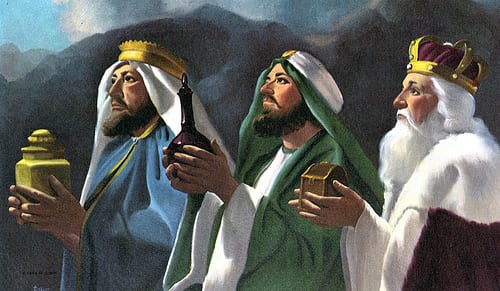
The Gospel account on the visit of the Magi according to Matthew tells us that the Magi came all the way from the east to Jerusalem and inquired of the newborn king of the Jews. At that time, King Herod I (aka Herod the Great) was king of Judea under Roman occupation. The magi were highly regarded across kingdoms as persons having more than human knowledge, therefore their inquiry of a new king was taken seriously by many, including Herod himself.
A brief background on Herod I: according to historical accounts, Herod was granted the title of “King of Judea” by the Roman Senate. As such, he was a vassal of the Roman Empire and he collected the taxes of that region for the Roman Senate. In one of his writings, the historian Josephus described Herod’s reign as tyrannical; he used spies to monitor the feelings of the general public towards him; he suppressed protests and used force to deal with his opponents.
Therefore, the news of a newborn king of the Jews greatly troubled Herod. After having ascertained from the chief priests and scribes that the Messiah was to be born in Bethlehem, he sent for the magi secretly and told them: “Go and search diligently for the child. When you have found him, bring me word, that I too may go and do him homage.” (Matthew 2:8) But the real intention of Herod was revealed by an angel to Joseph in a dream: “Rise, take the child and his mother, flee to Egypt, and stay there until I tell you. Herod is going to search for the child to destroy him.” (Matthew 2:13)
Eventually, the magi found the Christ child with the aid of a star. They prostrated themselves in homage to the child. Then they opened their treasures and offered him gifts of gold, frankincense, and myrrh. When it was time for the magi to go back to their country, they were warned in a dream not to go to Herod, and so they left using another route. (cf. Matthew 2:11-12)
Most probably, the magi had originally planned on telling Herod the whereabouts of the Christ child; but after the dream warned them about Herod, they had a decision to make – to tell or not to tell Herod. Should they disobey the king or not? Just because they weren’t subjects of Herod doesn’t mean that they weren’t taking any risks. After all, Herod could have sent soldiers after them for disobeying him. They also had to take a longer and less travelled route in order to avoid Jerusalem. But ultimately, the magi’s decision was recorded in the Gospel: “they departed for their country by another way.” (Matthew 2:12)
The light from the star led the magi to the Christ child, but more significantly, it was the Christ child – the Light for revelation to the gentiles (Luke 2:32) – who illumined their minds and hearts. The magi were among those who were called according to God’s design and grace (cf. 2Timothy 1:9): their discovery of the star, their long and arduous journey, their encounter with Herod, the gifts they offered to the Christ child and finally, the decision they made. The decision of the magi demonstrates to us that blindly obeying a king with evil intentions is not the right thing to do.
We are all called by Christ to live according to God’s design and grace; in baptism we have become children of God and sharers in the divine nature. In this way we are made holy, but we must hold on to and complete in our lives the holiness which we have received. We are called to have a heart of mercy and humility. We are called to follow the footsteps of Christ and conform ourselves to the will of God. We are called to devote ourselves to the glory of God and to the service of our neighbor. But there is one more thing – we are also called to make decisions according to God’s design and grace.